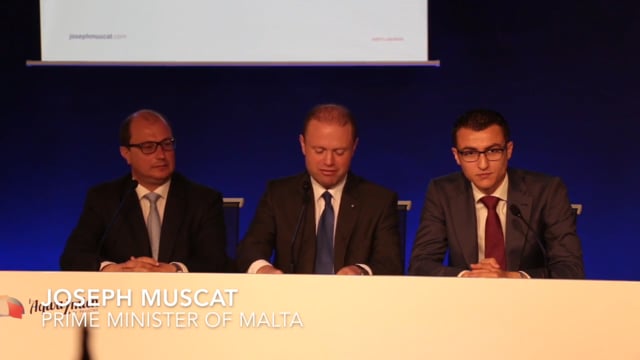[WATCH] Bannister to step down by end of year, Prime Minister reveals
The chairman of the Malta Financial Services Authority, Joe Bannister, has made it clear he intends to step down by the end of the year, Prime Minister Joseph Muscat said today


The chairman of the Malta Financial Services Authority, Joe Bannister, has made it clear he intends to step down by the end of the year, Prime Minister Joseph Muscat said today.
"Prof. Bannister approached me in the beginning of the year and told me of his intention to resign," he said. "We agreed he would stay on till the end of Malta's presidency and then start a process to leave the authority."
Muscat, who was addressing a press conference at the Labour Party headquarters with Stefan Zrinzo Azzopardi and Silvio Schembri on Day 22 of the election campaign, said that Bannister's resignation was not politically motivated and nor was it imposed on him.
He criticised Opposition leader Simon Busuttil for saying he would replace Bannister if he were to win the upcoming 3 June election, especially since chairpersons of authorities were covered by security of tenure.
"This is very frightening and sends a very dangerous message," the Labour Party leader said.
On his claims yesterday that he would be taking newly-surfaced documents, relating to the BWSC power plant, to the Auditor General for investigation, Muscat said the documents had been discovered in a file having nothing to do with the power plant.
"A memo discovered shows that Enemalta was against the government amending the country's emissions legislation to suit BWSC," he said. "It now seems that if then minister George Pullicino had not in fact changed the legislation, BWSC would not have been able to submit a successful bid for the power plant tender."
With regard to the Malta Files articles being published, the Prime Minister said that this was a concerted attack aimed at tarnishing the country's reputation but insisted Malta's fiscal system was fully legal and approved by the EU.
"In a way, I cannot understand why this happened, but maybe it was our turn after Ireland and Luxembourg," he said.
Muscat insisted no foreigner could use Malta's tax structure to avoid paying the full tax he would pay in his own country on money earned there.
"And I will not speculate on whether there was any hacking involved in obtaining the database, although all the data was already compiled online, if in a more restricted manner," he said.
Muscat said that the PL was proposing that in the future, the chairmperson of MFSA start appearing before parliament to face questioning.
Discussions on MFSA operations
Muscat also revealed that a new Labour government will lower the tax payable on overtime pay, following a study to ensure the system would not be open to abuse.
"We committed ourselves to this following the positive feedback we received when we decided to lower tax on part-time work," he said.
Muscat said that the blockchain strategy would see Malta cooperate closely with international partners on a number of projects that could establish Malta as a pioneer in niche industries.
"The technology inbred in the blockchain system being proposed would be of immense value to the lands registry and medical records," he said.
Muscat said that all the PL's measures were costed and were calculated to have a fiscal net effect of 0.5% of GDP or cost around €50 million per year.
Zrinzo Azzopardi said that Malta had benefited immensely from the stability brought about by this administration.
"Our country's strong economy is a result of our vision for prosperity with a purpose," he said. "Unfortunately we are now seeing some who are choosing to politicise a controversy that is targeting our financial services sector where we have before always acted in consensus for the greater good of the country."
Silvio Schembri said that in the coming five years, the Labour government would continue to work to maintain the economy on the strong footing it had managed to reach under this administration.
"This government has consistently rewarded hard work and was continuing to do so in its electoral proposals," he said. "The proposed tax refund for all workers who earn less that €60,000 is one measure that highlights our belief that hard work pays."
Around 190,000 persons would benefit from this proposal and would receive a minimum of €200 in refunds.
Schembri said that the PL was focused on creating new niche markets with a 10-year strategic plan drawn up to lay down plans on how to make Malta more attractive to investment.
The party had already identified FinTech and logistics as two sectors the country could enjoy broad success in Malta.
Schembri said the government would also seek international partnerships to attract more foreign startups to Malta.
He said the digital gaming industry could also be successful and the party was therefore committed to work to attract development studios of international renown.
"A new Labour government will immediately set in motion a plan to install a second internet cable between Malta and Europe," Schembri said.








.jpg)




.jpg)






.png)

